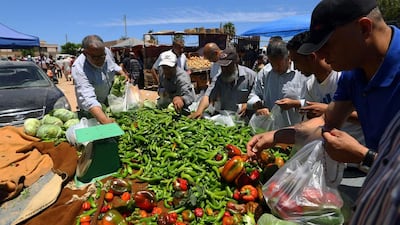TRIPOLI // Ramadan began on Saturday with a bitter taste for residents of the Libyan capital, with cash shortages adding to their worries about rising prices and escalating violence.
Dawn queues outside banks to withdraw a few dozen dinars have become routine for most Libyans, as the country faces a liquidity shortfall.
Despite the daily difficulty of getting by, the small Tomzini grocery store was still crowded on the eve of Ramadan — but shoppers are being cautious this year. Prices have multiplied by three or four times this year in Libya, including at Tomzini which is famed for its fresh spices.
.
“Instead of buying three kilos of almonds, I’m buying three dinars’ worth, just for decoration,” said young mother Mariem, as her little girl gazed longingly at large baskets of multi-coloured sweet treats.
Prices have multiplied by three or four times this year in Libya, including at Tomzini which is famous for its fresh spices.
Most Libyans these days are having to adapt their spending habits to ensure they are still solvent at the end of the month and buying in bulk is now a thing of the past.
“I have to be careful. I’m not sure I can replace every dinar that leaves my pocket,” said civil servant Moftah Al-Barrani, 59. “We haven’t been paid for months, and even if I still have money in the bank I can’t get at it because there is no cash.”
People still wanted to shop, he said, in case prices rose further because of demand during Ramadan.
In a market in Tajoura, an eastern suburb of Tripoli, overnment official Sabri Al-Bouechi greed that “living conditions are below zero”. He added, “I’m just an ordinary guy like those who queue up outside the bank. Officials should have pity on people.”
As a result of the cash shortage, the businesses that do best are those that accept cards and cheques.
In addition to economic mayhem, Libyans have also had to cope with a country in chaos after the 2011 revolution that ousted and killed Muammar Qaddafi.
On Friday, clashes in the capital between forces loyal to the UN-backed Government of National Accord (GNA) and rival militias killed 28 people and wounded 130 more, according to the health ministry.
The fighting broke out in the south of the city after several months of relative calm in Tripoli, with heavy weapons used in residential areas.
The GNA condemned the clashes, saying, “This is their gift to the people for the month of Ramadan.”.
With the spirit of Ramadan in mind, esidents’ associations in Tripoli have mobilised over the past two months to collect food supplies for needy families.
“There’s no point in praying and fasting when a neighbour goes hungry,” said Samer Fayyadh, who runs a fast-food restaurant in Tripoli.
In an attempt to counter the effects of the economic crisis, the central bank decided to spend more than $550 million on food imports for Ramadan.
This is despite the constant risk of subsidised products being diverted by unscrupulous traders.
* Agence France-Presse

